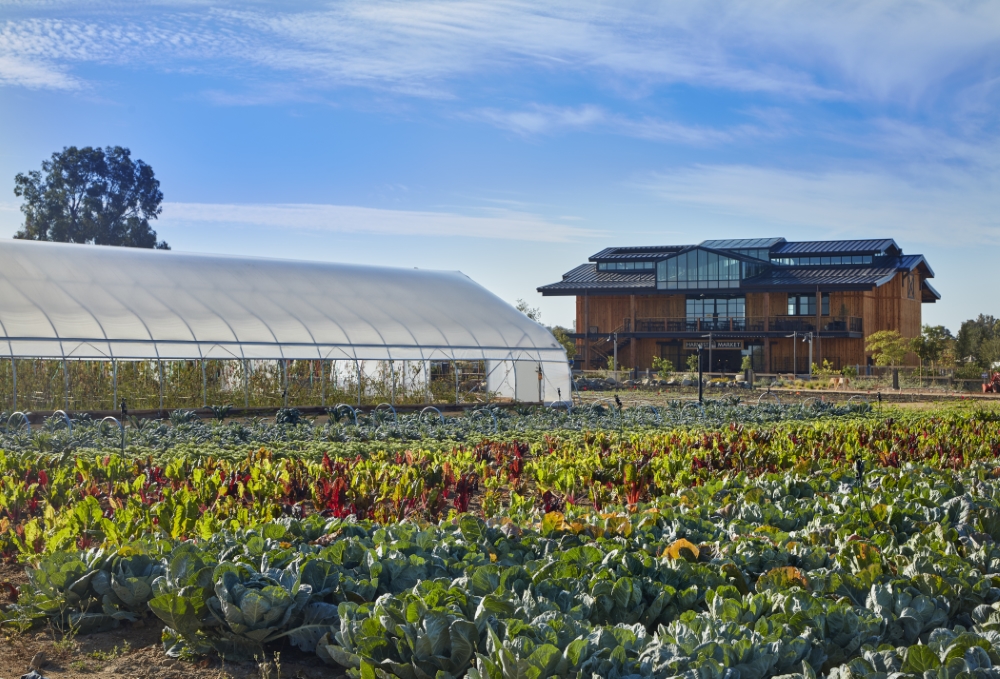Is the zeitgeist right for ‘agrihoods’?
Would you rather invest in a golf course community or one where valuable property is profitably used to grow food?
“Agrihoods” are gaining steam as an alternative real estate strategy targeting affluent, younger demographics that are jazzed by the prospect of living and raising families among nature and abundant, organic food sources.
According to the Urban Land Institute, there are now about 200 “agrihoods” in more than 30 states across the United States, with such developments increasingly popping up not just in rural areas but also in proximity to major cities. ULI defines agrihoods as “single-family, multifamily, or mixed-use communities built with a working farm or community garden as a focus.”
In Encinitas, California, on the site of a former poinsettia farm, construction is nearing completion on a $230 million mixed-use coastal enclave described by its backers as the first agrihood of its kind in scale and caliber. Fox Point Farms is the vision of Brian Grover, founder and managing partner of Nolen Communities, in partnership with Shea Homes, one of the nation’s largest private home builders.
“The potential for agrihoods is enormous,” says Grover. “Consumers are increasingly drawn to more sustainable, community-centric models of living, and agrihoods meet that demand. They offer more than just homes. They provide a deeper connection to the land, a unique revenue model through the integration of working farms and public amenities, and a chance to get away from the cookie-cutter master-planned communities we’ve seen for so long.”

“The potential for agrihoods is enormous.”
— Brian Grover, Managing Partner, Nolen Communities
Bringing It All Back Home
Grover traces his interest in the agrihood concept to a course he took at the University of California San Diego in the early 2000s on the history of urban sprawl. It steered him toward a minor in Urban Studies and Planning and then a graduate degree from the University of North Carolina.
“It was intriguing to me,” Grover told Site Selection in February, “to learn about post-war suburban development and how it led to all these psychological effects that are coming to the fore now, like social isolation. The vision for Fox Point Farms has always been to reconnect people to each other and to the land, and to create a sustainable, resilient community that can serve as a model for future development. It’s how most everybody lived a hundred years ago, and so it’s not a novel concept. It just seems that way because we’re so far removed from how people used to live and feed themselves.”
The 21-acre development is centered around an eight-acre commercial center, close to half of which is devoted to an organic farm that yields fruits and seasonal vegetables. Everything raised there stays within Fox Point Farms, which includes a farm-to-table restaurant, organic market, farm-to-tap brewery and coffee roaster, plus hands-on farming and educational programs with farm animals.
That’s all up and running. Well underway is construction on 250 homes to include cottages, carriage homes, townhomes, single-level flats and affordable housing units, along with a state-of-the-art recreation center, pool, spa and walking trails. Nolen says nearly all of the homes are under contract, making Fox Point Farms one of Shea’s best-performing communities from a sales standpoint.
‘The Kids Are Running the Show’
Daron “Farmer D” Joffe is one of Grover’s mentors. He is widely touted as one of the country’s most experienced agrihood designers, having consulted on projects including Southern California’s formative Rancho Mission Viejo and the wildly successful Serenbe, southwest of Atlanta. Other standout agrihood communities include Agritopia, near Phoenix; South Village in South Burlington; Prairie Crossing in Grayslake, Illinois; and Hidden Springs in Boise, Idaho.
There are agrihood projects that have failed, and others that have fallen well short of what was promised in marketing materials and presentations to zoning officials and tax authorities. “Green washing” is out there.
“I’ve seen projects before,” says Grover, “where it was little more than a shtick to get it approved by the community and city council and then the shtick would largely go away. I got a little bit disillusioned when, post approval, a lot of what we would put into site plan would get stripped. I always wanted to do a project the right way, and that became my business model for Nolen Communities.
“I take some solace,” he says, “in the fact that the kids are running the show now. It’ll be cool to see the evolution of this concept, which is really something very old made new again.

